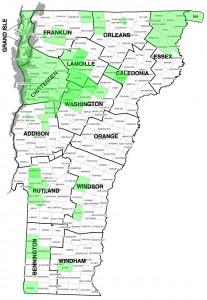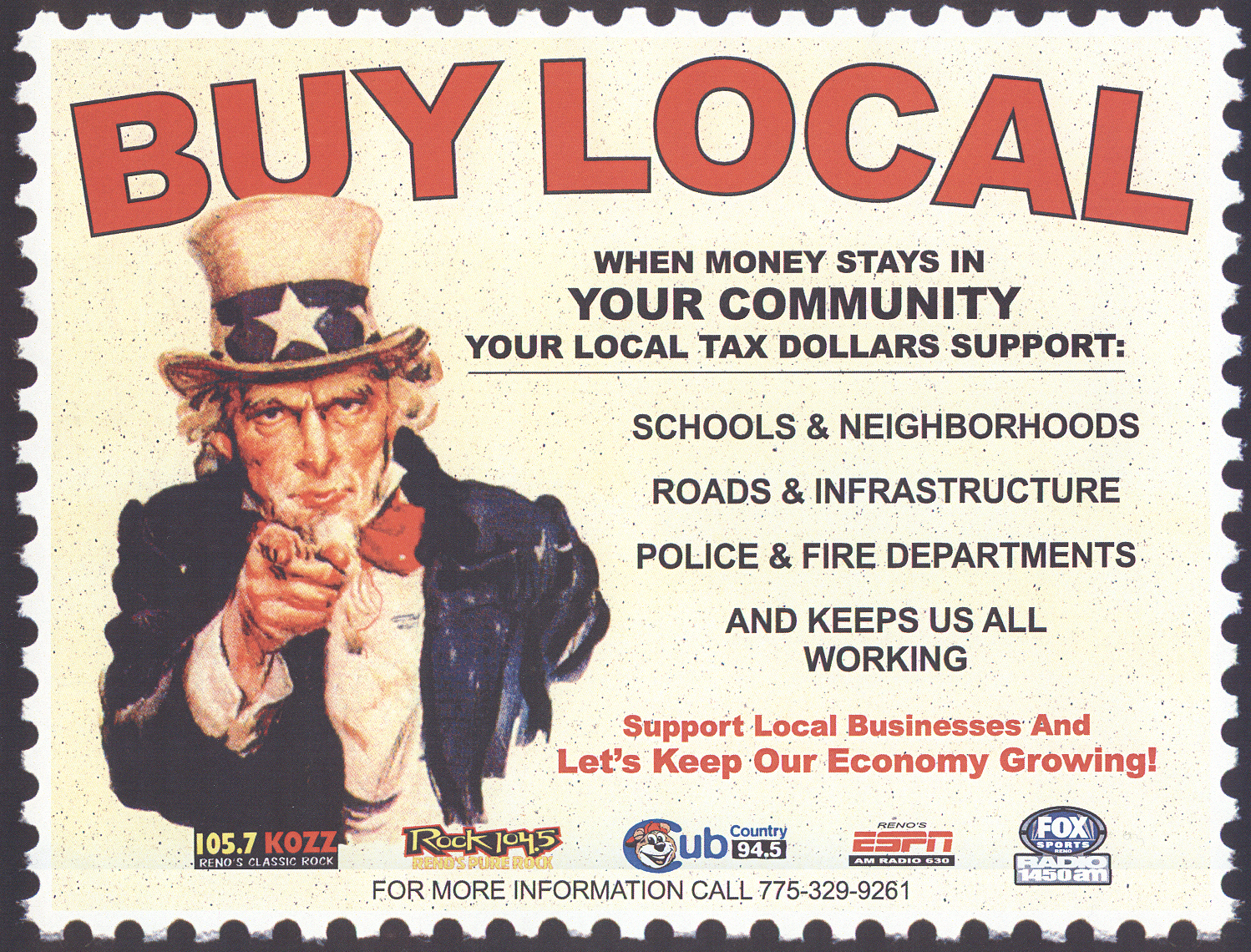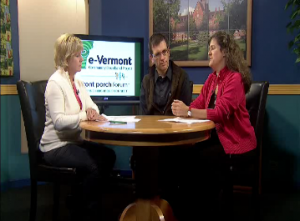Yearly Archives: 2011
LocalvoreToday and Healthy Communities
 #BTV #VT – Sarah’s got a fascinating blog revving up at LocalvoreToday…
#BTV #VT – Sarah’s got a fascinating blog revving up at LocalvoreToday…
There’s no disputing that humans are social animals, although these days we often don’t get enough social interaction. For those fortunate enough to live in communities with close networks of friends, neighbors, and relatives, the benefits to physical and mental health can be astonishing. Most of us intuitively know that having strong social ties are a good thing, but a growing body of research has shown that the correlation between overallmental and physical health and feeling connected with friends, family, and neighbors is much stronger than one would think. The same is true on a community level. Communities with strong social ties often report less crime, more civic engagement, and higher property values, to name a few of the benefits.
But this day in age, it’s difficult for people in many communities to know how to foster that sense of connection. Our time is too often taken up by activities that are contrary to fostering social engagement, including driving, eating alone (and often in our cars), and watching t.v. In the age of Facebook, ironically, Americans report having only two close friends, a drop from three in 1985. And Americans report consistantly that they are less happy““thanks in large part to decreased social capital. Even for folks who recognize the problems with these declines, it can often be difficult to find a resource for bringing folks together.
That’s where a website like Front Porch Forum becomes important… I myself had used FPF only in a work-related capacity, so I was eager to try it out on my own time. After typing in my street address, I was welcomed into the Buell Neighborhood Forum… [it] currently has 559 members, serves 750 households, and has had 777 messages posted since it began.
Each “issue” of FPF posts roughly every three days, with moderators involved in the process. In that way, FPF differs from a service like Craigslist in that it does not consist of anonymous posters publishing information over the internet; rather, it is the full names of people in my community posting information specific to my neighborhood. On my first tour through FPF, I was surprised to see the amount of postings dedicated to civic matters that I otherwise may have been unaware of. I also quickly learned that a meeting was being held along with a free public dinner to discuss plans to rebuild a recently burned-down building in my neighborhood.
For all the great qualities of Facebook, with which I can connect to distant friends and acquaintances from a world away, FPF quickly proved its effectiveness at fostering true community engagement. And in a world in which real social connections seem harder to come by, a service like Front Porch Forum may be increasingly important.
And her next posting extends her thinking…
We live in a culture obsessed with health… But what if there’s more to health than just diet and exercise? What if the strength of the communities we inhabit have, perhaps, more to do with our health than any other factor? And what if, even in the face of a high-fat diet and less-than-stellar lifestyle choices, you still find that where you live has more to do with your overall health than anything else?
Such is the case outlined in Malcom Gladwell’s 2008 book Outliers… It’s a fascinating book, but for the purpose of this blog post I’m interested primarily in the book’s preface.
In the preface to this book, Gladwell looks at the unique case of Roseto, Pennsylvania, a town that in the late 1950″²s came under the scrutiny of Dr. Stewart Wolf. Wolf took notice of an anomaly in the statistics regarding the town’s health: for men over 65, the death rate from heart disease was half that of the rest of the U.S., and while at the time heart attacks were the leading cause of death for men under 55, virtually no male in that age group from Roseto suffered from heart-related problems. And across the board, the death rates from all other causes in Roseto were markedly lower than they should have been. It was a community without suicide, alcoholism, or drug problems. The crime rate was very low. This little town of about 2,000 in Pennsylvania represented a statistical anomaly that flew in the face of the common medicinal thought of the time.
Intrigued, Dr. Wolf got to work studying the people of the town. He examined people across the U.S. hailing from the same region of Italy as Roseto’s residents, and found that whatever made Rosetans special, it wasn’t in their genes. He looked at the food they ate, which consisted mainly of a high-fat diet of pizza, pastas, and Italian pastries, much of it cooked in lard. He looked at their lifestyles and rates of exercise, but those gave no clues; by all accounts the Rosetans lived lifestyles no healthier than their neighbors.
The one factor that seemed to differentiate Roseto’s residents is that they lived in an intensely close-knit community. Having immigrated from the same region of Italy beginning in 1882, the Rosetans built a town largely insular from neighboring communities… In any one house in Roseto, multiple generations of family members lived under the same roof. Neighbors cooked dinners for each other, stopped for long conversations in the streets, and on Sundays attended Mass as a community. During the days the men of the town went to work together in the slate quarries while the women worked in blouse mills. The Rosetans had been successful in transplanting the culture of their native Southern Italy to Eastern Pennyslvania, creating a town that was uniquely supportive of its community members and shielding its residents from the modern mental ailments of loneliness, anxiety, and depression. This appeared to translate into overall physical well-being, despite factors like genetics, diet, and exercise.
This example of an outlier is so intriguing because it truly illustrates the power of community to shape us. In my last blog post, I looked at some of the data demonstrating that Americans are largely less happy than in years past, reporting fewer close friends and residing in less cohesive communities. I looked at how a website like Front Porch Forum works to foster stronger community relations by connecting neighbors and spurring civic engagement. In Vermont, where close-knit communities are more the norm than in many other parts of the country, it is important that we continue to work to make our communities that much stronger. That means supporting local businesses when we can, buying food from our local farmers, and supporting local artists, artisans, musicians, and others in our communities…
Waterbury and Duxbury join Front Porch Forum

#VT – Exciting news! Front Porch Forum is now available in Waterbury and Duxbury, Vermont. Already 100 neighbors have signed up in Waterbury and another 50 in Duxbury!
Given the twin blows of Hurricane Irene and the State Office Complex pull-out, we’ve been working hard with a number of partners to find a way to start serving these communities. A special thanks to Ben & Jerry’s Foundation, Revitalizing Waterbury, Town of Duxbury, Ben & Jerry’s Homemade, and a number of individuals for getting it done.
Now comes the fun part! Please spread the word and encourage any and all in Waterbury and Duxbury to sign up at FrontPorchForum.com
FPF is now available in 70 Vermont towns. Here’s the list of towns.
VIDEO: “Across the Fence” Examines Front Porch Forum
#BTV #VT – Host Judy Simpson interviewed Susan Clark and myself about Front Porch Forum and e-Vermont on Across the Fence on WCAX this month (10/20/2011). Susan is the Town Moderator in Middlesex and an expert on Town Meeting in Vermont. Here’s the video…
Did I really just do that? For five years?
 #BTV #VT – I don’t think of myself as a blogger, yet this blog turns five years old today… guess it kinda snuck up on me. Hard to imagine I’ve written 1,150 postings over that time. I started blogging a month or two after launching Front Porch Forum, which now has 30,000 households participating, including half of Burlington.
#BTV #VT – I don’t think of myself as a blogger, yet this blog turns five years old today… guess it kinda snuck up on me. Hard to imagine I’ve written 1,150 postings over that time. I started blogging a month or two after launching Front Porch Forum, which now has 30,000 households participating, including half of Burlington.
Thanks to the blog’s many regular readers. Our frequent back-and-forth (mostly off-blog) about the quickly heating up “neighbor conversation” online space is fascinating. Dozens of start-ups are now aiming to help neighbors connect. We’re glad for the company. I invite more of them to contribute to the field by frequently blogging about what they’re learning. Hosting sustainable neighborly online discussions across many neighborhoods is not trivial!
Many of the pundits who focus on adjacent spaces — hyperlocal journalism, social networking, daily deals, etc. — are slowly waking to the staggering potential of online neighborhoods. We’ve seen it first hand in our super successful pilot. Neighbors, local businesses, public officials, nonprofits… they all flock to Front Porch Forum and put it to excellent use.
There’s monster demand across North America for connection to place and neighbors. The opposite — which too many of us experience now — is untenable… living with a neutered sense of community, being surrounded by strangers for years on end, not knowing what’s going on in the neighborhood, not feeling a sense of ownership of your place. Ugh.
Here’s to the next five years!
Nextdoor.com Enters “Neighbor Conversation” Online Space
![]() Congratulations to Nirav Tolia and his team at Nextdoor.com. After a year of testing, they lifted the cover from their new service this week. We welcome another player into the “neighbor conversation” online space. They join Whitepages.com’s Neighbors, MSNBC.com’s Everyblock, and about 20 other start-ups working to help neighbors connect.
Congratulations to Nirav Tolia and his team at Nextdoor.com. After a year of testing, they lifted the cover from their new service this week. We welcome another player into the “neighbor conversation” online space. They join Whitepages.com’s Neighbors, MSNBC.com’s Everyblock, and about 20 other start-ups working to help neighbors connect.
Will they get traction? Will they generate significant revenue? To the first point, many efforts in this space seem a mile wide and an inch deep with broad reach and little traction. To the second… in Nextdoor’s case, they’re not trying yet.
This is in stark contrast to Front Porch Forum which has incredible particpation, albeit in a single region. Half of Vermont’s largest city participates in FPF. And they aren’t just lurkers. Whereas much of social media content is provided by a slim 1-10% of users, on FPF a majority of our members speak up… and the tone is consistently neighborly. Also, we’re seeing great results with our recently launched neighborhood-specific advertising system for local businesses.
Front Porch Forum has given me information, income, and, best of all, the first real feeling of connection to this town after living here for 22 years!– Anne Howland, Middlesex, VT, FPF member
FPF’s super-charged level of engagement doesn’t come easy. Many players in the neighbor-conversation space will fail because they’ll substitute tech bells and whistles for real understanding of the social demand that they’re trying to meet… or because they’ll scale too fast and thin.
Achieving critical mass in hundreds of nearby small online neighborhood groups AND getting folks to stick around for years AND speak up AND keep it civil… this is hard stuff. And this is what FPF is doing successfully now across one-third of Vermont. We’ve developed a complex and nuanced system that we’re pushing from our seasoned staff into our code base as we approach scaling.
Commentary about the Nextdoor launch…
About Blog
Ghost of Midnight is an online journal about fostering community within neighborhoods, with a special focus on Front Porch Forum (FPF). My wife, Valerie, and I founded FPF in 2006... read more
Post Categories
- Uncategorized
- PDF2009
- Calendar
- Northeast Kingdom
- podcast
- Peer Rental
- Localization
- Big Tech
- Events
- PDF2007
- Web Traffic
- Google AdSense
- Pay It Forward
- Elections
- berkmansunlight
- Maps
- Video
- Upstate New York
- Coupons
- Wildlife
- Mobile
- Viral Marketing
- Raffle
- Crisis Response
- Donations
- Lost & Found
- Real Estate
- College Students
- Gratitude
- Social Responsibility
- Orton Family Foundation
- Start ups
- Make It Your Own Awards
- Online Civility
- Clay Shirky
- Newspapers
- Humor
- How To Use FPF
- Online Classified Ads
- Peer Reviews
- Best of FPF
- Politics
- Community Management
- Economic Development
- Local Reviews
- Case Foundation
- Borrow and Lend
- Neighborhood Watch
- Good Government
- Small Business Advertising
- Citizen Journalism
- e-Vermont
- Democracy
- Local Search
- Knight Foundation
- Burlington
- MacArthur Fellows
- Civic Engagement
- Social Media
- social capital
- Social Networking
- Vermont
- Neighborhood
- Community Building
- Local Online
- Front Porch Forum
 Today’s Burlington Free Press had a
Today’s Burlington Free Press had a  Dave in Bristol #VT just shared this nugget. He had a trampoline he was looking to unload. He listed it on
Dave in Bristol #VT just shared this nugget. He had a trampoline he was looking to unload. He listed it on  As a friend said recently… “So much of the Internet feels like a fire hose of information, but FPF is like slow-drip irrigation.” I’m not sure how I feel about being compared to a soaker hose… guess we’ve been called worse. 😉
As a friend said recently… “So much of the Internet feels like a fire hose of information, but FPF is like slow-drip irrigation.” I’m not sure how I feel about being compared to a soaker hose… guess we’ve been called worse. 😉